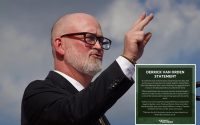MA man disgusted by wife’s remains being sold in Harvard morgue scandal
A Massachusetts man said he was disgusted to learn that his late wife’s remains may have been sold through a human remains trafficking ring after she donated herself to Harvard Medical School for research.
“What bothers me is that there’s somebody in some basement somewhere in this country or elsewhere fondling my wife’s body parts,” Jack Porter told the Boston Herald.
“It could be her brain, her skin, her bones. This is disgusting and this is why there should be a severe punishment.”
Porter, a research associate at the Ivy League school, told the paper that he received a letter that the body of his beloved wife Raya Porter could have been divided up and sold on the black market in a scheme allegedly led by the ex-morgue manager of the medical school.
“We have been working with information supplied by federal authorities and examining our records, particularly the logs showing when donor remains were sent to be cremated and when Lodge was on campus, to try to determine which donors may have been impacted,” Dr. George Daley, the dean of the faculty of medicine at Harvard Medical School wrote, according to the Herald.
“At this time, we cannot rule out the potential that Raya Porter’s remains may have been impacted.”

Harvard Medical School’s former morgue manager Cedric Lodge, 55, and six others have been charged in connection to an underground ring that stole corpses and body parts from the university and an Arkansas mortuary and crematorium to sell online.
Lodge allegedly robbed many corpses — including those of two stillborn infants — meant for science from his employer and sold them with the help of his wife Denise, 63, from 2018 to March 7 of this year, federal prosecutors said.
Porter’s wife of six years died at age 57 of colon cancer in November 2017, according to NBC 10 Boston. A doctor in her native Ukraine, Raya decided to donate her body to science for future doctors at Harvard for medical training.
Her body was in the custody of Harvard at the time when Lodge allegedly began the sickening scheme.
Porter said he received her cremated remains in Feb. 2019. He scattered half in the ocean and brought the other half to her mother and daughter in Ukraine.


But now he’s left questioning whether he received all of his wife — who he said he fell in love with at first sight.
“I believe that they can recover some of these parts,” he said. “All of us who are family members believe it’s a horrible thing that happened.”
Porter said, as the son of Holocaust survivors, he felt deeply hurt that his beloved wife’s remains may have been misused.
“This especially hurt me … that they took the skin and tanned it just like the Nazis did too sometimes,” he told NBC Boston. “That part really astounded me that people in America would do this and sell these things.”


The Harvard employee said that many families whose loved ones’ remains were stolen and sold through the black market have been too troubled to speak publicly about the horrific discovery.
“Most of the families are in deep anger or deep anguish,” he told the Herald.
Another woman said she felt like she was going to throw up when she learned her father’s body was stolen from Harvard and is now demanding the university return her mother’s remains as both her parents donated them for medical research.
“We were just disgusted — sick, like we were going to throw up,” Paula Peltonovich, of New Hampshire, told the Boston Globe on Thursday. “It’s just unthinkable. There’s no words.”
Porter had some tough words for those involved in the ghastly crimes — one of whom bought a human skull to make into a doll.
“I would say, you guys are sick. You’ve got to look at yourself and face your family and friends and you are going to be ostracized for the rest of your life,” Porter told NBC Boston he would tell those involved in the ring. “It’s so deviant, I just pity the person. I don’t have any anger against them. I just pity them for what they did.”
Daley, the dean of faculty, called the alleged human body trafficking ring “reprehensible” and offered apologies “for the pain and uncertainty caused by this troubling news.”


